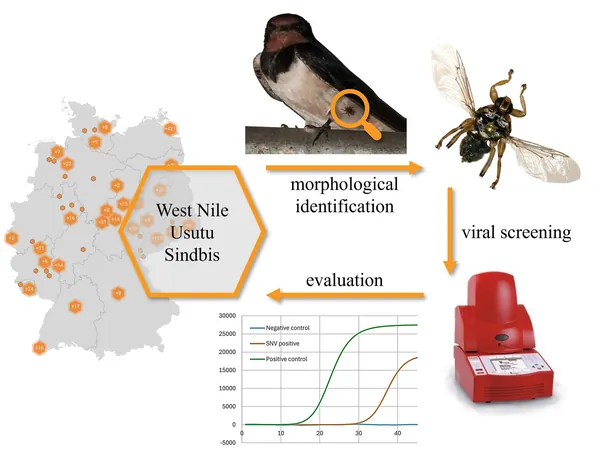
Unveiling the Hidden Dangers: Is Your Bird at Risk from Deadly Viruses?
2025-06-01
Author: Nur
The Overlooked Role of Louse Flies in Virus Transmission
While much attention has been given to mosquitoes and ticks as primary vectors for viral infections, a groundbreaking study from Germany reveals that louse flies, often ignored, may play an essential role in spreading harmful viruses.
What Was the Study About?
Researchers aimed to investigate the presence of three dangerous viruses—West Nile virus (WNV), Usutu virus (USUV), and Sindbis virus (SINV)—in avian louse flies collected from various regions in Germany between 2016 and 2022. The study sought to assess whether these flies could serve as effective sentinels for monitoring these arboviruses, known for their zoonotic potential.
Key Findings from the Research
Out of 1,000 louse flies examined, only two specimens revealed viral RNA—one for USUV and one for SINV—both from the species Ornithomya avicularia. This marks the first detection of these viruses in louse flies globally! While WNV went undetected, the findings raise alarm bells about the potential risks presented by these often-overlooked parasites.
The Bigger Picture: Virus Evolution and Migration
The West Nile virus has been reported in various parts of Europe, notably spreading since its first identification in Germany in 2018. USUV has similarly shown alarming signs of expansion across the continent, affecting not only birds but posing risks to humans, especially those with weakened immune systems. People can experience severe symptoms from these infections, echoing the need for heightened surveillance.
Why This Matters
This research underscores a crucial shift in our understanding of vector-borne diseases. As avian louse flies can impact multiple bird species and are capable of traveling great distances, they might act as significant conduits for viral transmission. Thus, monitoring these flies may be vital in anticipating outbreaks and implementing effective public health responses.
Louse Flies: The Forgotten Sentinels?
Louse flies have long been seen as only minor players in the vector landscape. However, this study highlights their potential risk, suggesting that surveilling these insects could provide valuable insights into arbovirus dynamics. The research calls for more extensive investigations into their vector competence and the factors influencing virus transmission among bird hosts.
Looking Ahead: The Need for Vigilance and Research
Despite the low detection rates observed in this study, the prospect that louse flies could harbor harmful viruses necessitates enhanced monitoring strategies. Future investigations should aim to clarify the potential for these flies to transmit viruses effectively, ensuring that we stay one step ahead of emerging zoonotic threats.
As we continue to navigate the complexities of infectious diseases, understanding all potential vectors—like the louse fly—becomes increasingly critical in safeguarding public health.


 Brasil (PT)
Brasil (PT)
 Canada (EN)
Canada (EN)
 Chile (ES)
Chile (ES)
 Česko (CS)
Česko (CS)
 대한민국 (KO)
대한민국 (KO)
 España (ES)
España (ES)
 France (FR)
France (FR)
 Hong Kong (EN)
Hong Kong (EN)
 Italia (IT)
Italia (IT)
 日本 (JA)
日本 (JA)
 Magyarország (HU)
Magyarország (HU)
 Norge (NO)
Norge (NO)
 Polska (PL)
Polska (PL)
 Schweiz (DE)
Schweiz (DE)
 Singapore (EN)
Singapore (EN)
 Sverige (SV)
Sverige (SV)
 Suomi (FI)
Suomi (FI)
 Türkiye (TR)
Türkiye (TR)
 الإمارات العربية المتحدة (AR)
الإمارات العربية المتحدة (AR)